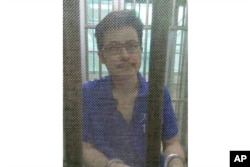A Chinese court Thursday sentenced Yang Maodong, a veteran pro-democracy activist, to eight years in prison on subversion charges for his two-decade advocacy of rights and freedoms.
Yang, better known by his pseudonym Guo Feixiong, was sentenced by the Guangzhou Intermediate People’s Court for "inciting subversion of state power," according to his brother, Yang Maoquan, whose message has been posted on Twitter by a network of Chinese rights lawyers. Phone calls to the court went unanswered on Friday.
The court convicted Yang, 56, for his "long-term attack and smearing of the Chinese political system" and "incitement of others to subvert state power" through his online essays and website that advocated constitutional democracy, his brother wrote in the message. He was also accused of talking to the foreign media after he was barred from travelling to the United States to see his ailing wife, Zhang Qing, in 2021. The authorities have detained him ever since. He was "formally arrested," or charged, in January of last year, two days after his wife died.
In addition, the court handed down three years of "deprivation of political rights," which forbids Yang from taking public positions, speaking publicly and publishing after he is released.
In his self-defense statement to the court, which has been posted on overseas websites, the former philosophy teacher contested the subversion charges and insisted he was innocent.
"In writing my essays and publishing them on the website I founded, I was openly exercising my basic civil and political rights, freedoms of speech and thought as well as academic freedom," he wrote. "Now they are settling accounts for my 20 years of intellectual activities, and I’ve been prosecuted as a ‘hostile forces’ stereotype."
He noted that he had been incarcerated for a total of 11 years in his two previous jailings and four criminal detentions in the 14 years between 2005 and 2019.
"This is my third imprisonment. From ‘illegal publishing,’ ‘gathering crowds to disturb public order’ to ‘inciting subversion,’ I expect I’ll be convicted," Guo wrote, but he swore he would not give up his values.
"From my first participation in student rallies in 1986 to now, my political aspiration has never wavered: to implement genuine freedoms, democracy, human rights and rule of law in China."
Western embassy representatives were prohibited from attending Guo’s sentencing.
"We continue to call for Mr. Guo’s speedy release so he may be reunited with his family," tweeted the U.S. Embassy in China. The EU delegation and the German ambassador, Patricia Flor, also called for his release.
A legal consultant working for Chinese lawyers Gao Zhisheng in 2005, Yang became well-known for helping people in Taishi village in southern China to defend their land rights. He was often harassed, beaten, tortured during his previous detentions and jailings. Gao’s whereabouts are unknown after years of detentions and jailings, during which he was also tortured.
"This is blatant prosecution," said Yang Zili, a Chinese activist who had also been jailed for eight years on the same subversion charge and now living the United States. "No matter how peaceful and rational one’s political beliefs are, as long as it deviates from the Communist Party propaganda, one has committed a thought crime."
William Nee, a U.S.-based researcher at Chinese Human Rights Defenders, a coalition of Chinese and international human rights nongovernmental organizations, called Guo’s sentencing "yet another instance that demonstrates the Chinese government’s extreme hostility towards democracy and constitutional government.”
"It’s also a warning signal to anyone hit by exit bans of what might happen if they publicly object," he said.






